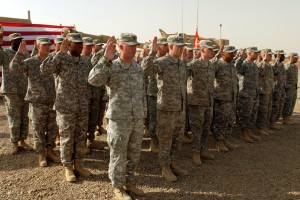
Soldiers who don’t meet MOS requirements will be reclassified or kicked out
Regular Army enlisted soldiers who are not qualified in their MOS will be reclassified or involuntarily separated under a new quality control program launched by Human Resources Command.
Under a process that began in October, the command will conduct quarterly reviews of the Army’s master personnel data base to identify soldiers whose records indicate they are not qualified in their military occupational specialty.
Requirements can vary greatly between MOSs, and typically involve such issues as physical profiles, military education, professional certifications and training. Soldiers could also be deemed unqualified if they were not awarded a required security clearance, or their clearance has been revoked.
“At a time when the Army is drawing down, we cannot afford to keep soldiers in an MOS if they are not qualified,” said Jim Bragg, chief of the retention and reclassification branch.
Regarding security clearances, HRC’s enlisted retention and reclassification branch will provide field commands with a list of soldiers who do not have a valid one on file.
Soldiers will not be placed on the notification list if their clearance has lapsed, or is being processed through security channels, Bragg said.
Once in possession of the HRC list, command officials, typically career counselors and company-level commanders, will investigate to confirm if the HRC information is correct.
If the information is erroneous, the personnel record will be corrected, and the soldier will be considered MOS qualified.
If the HRC information is correct, the unit’s command career counselor, a senior NCO whose serves as the Army’s field reclassification authority, will notify the brigade commander or the first colonel in the soldier’s chain of command.
Commanders will have the authority to recommend that a soldier be retained on active duty and reclassified to a new MOS, or processed for involuntary separation.
“What we want is for commanders to correct that information if it is wrong,” Bragg said. “If it is correct, then we want commanders to submit the soldier for mandatory reclassification.”
“We will then try to find that soldier a new MOS,” he said.
The database reviews, to be made during the first month of each quarter — October, January, April and July — are designed to assist commanders in assuring their soldiers are qualified to support the unit’s mission by taking a “top of the system” look a data element recorded in the Total Army Personnel Data Base.
Bragg said the HRC reviews are not targeted at temporary disqualifications, such as bars to re-enlistment or a medical condition involving a temporary condition.
“We are looking at people who had a qualification revoked or denied, and is just not reflected in the file,” he said.
Soldiers who are recommended for retention by their commander will be processed for mandatory reclassification by their servicing career counselor to Human Resources Command using RETAIN, an automated system for processing re-enlistments and reclassifications.
Bragg said soldiers can select up to three MOSs as candidates for reclassification, but the overriding factor in HRC’s decision to approve a reclassification will be based on Army requirements.
Two months after MOS qualification notices are provided to career counselors, HRC’s retention and reclassification branch will review the master personnel data base to identify soldiers who are still not qualified in their primary MOS, and are not pending reclassification or separation.
In such cases soldiers will be processed for an Army-directed reclassification into a new MOS, or assigned special reporting code 09U, which will identify them as being unqualified in their MOS.
Once a soldier is assigned that code, they will be separated within 90 to 270 days.
“We only will use that code when we absolutely have no other option to reclassify the soldier,” Bragg said.
Field commanders are responsible for monitoring some matters that can influence a soldier’s MOS qualification, such as the specialty-specific requirements described in Army regulations and pamphlets, particularly the service’s MOS Smartbook (DA Pam 611-21).
In this regard, commanders are responsible for validating qualifications that are required, but not reflected in the Total Army Personnel Data Base.
For example, Army medics in MOS 68W (health care specialist) are required to maintain a National Registry of Emergency Medical Technicians certification to be MOS qualified. However, that information is not reflected in the master personnel data base, but should be known by the soldier’s chain of command.
According to the directive implementing the new quarterly review process (MilPer Message 14-306, dated Oct. 16), commanders at the company, battery and detachment level are responsible for identifying soldiers who fail to maintain their MOS requirements.
SOURCE: Army Times




